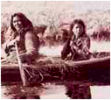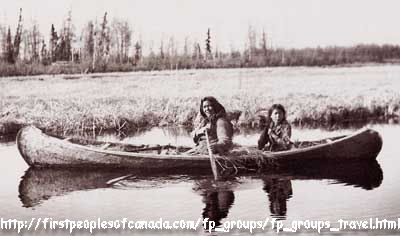An Aboriginal Speaks : Cut Immigration Until Aboriginal Unemployment Falls Dramatically
 Although First Nations are still dealing with the adverse effects of Colonization and Residential Schools, a new threat looms on the horizon. As Statistics Canada figures imply, immigration could likely be the next great obstacle that Canada's First People have to overcome in the fight to improve their lives.
Although First Nations are still dealing with the adverse effects of Colonization and Residential Schools, a new threat looms on the horizon. As Statistics Canada figures imply, immigration could likely be the next great obstacle that Canada's First People have to overcome in the fight to improve their lives.

By Curtis Dekoning
(Edited by Christy Anderson, MA student, University of Manitoba, Winnipeg)
I am an Aboriginal.
Here in Canada, Aboriginal People are given only nominal historical and cultural recognition. Canada has dedicated February as Black History Month and May as Asian Heritage Month, but all that Aboriginals get is one day, June 21. Yet we are North America's first people.
The Jews have drawn the entire world's attention to their Holocaust, but it is nothing compared to the North American holocaust created by European colonizers : 120 million Native North American Men, Woman and Children massacred in the name of progress. Yet we have no memorials.
The great irony is that a New Holocaust has begun. Giving much more recognition to Aboriginal history and all the dark events in it could help to extinguish the New Holocaust. But if that and other measures, including a very important cut to immigration, are not taken now, this New Holocaust will include both Aboriginals and the descendants of the European people who colonized Canada.
There is little doubt that the New Holocaust is being caused by Canada's mass immigration policy which can best be described as the re-colonization of Canada.
Many changes impacting on Canadian Aboriginals
As a long term resident of the inner-city of Winnipeg, Manitoba, I have seen many changes over the last 25 years that have negatively impacted the lives of Aboriginal Peoples.
Here's an example of the negative impact : As many probably know, Manitoba has the highest Aboriginal population, per capita, in all of North America. According to the 2006 Statistics Canada census, the employment rate among immigrants is a country-leading 73.1 per cent and their unemployment rate is only 6.8 per cent, the second lowest in Canada.
In contrast, statistics from the same 2006 census show that Canada's First People have much lower employment rates and much higher unemployment rates. The 2006 data shows that the employment rate for First Nations people aged 25 to 54 living in Winnipeg was only 57.8%.
Although First Nations are still dealing with the adverse effects of Colonization and Residential Schools, a new threat looms on the horizon. As Statistics Canada figures imply, immigration could likely be the next great obstacle that Canada's First People have to overcome in the fight to improve their lives. Canada is a "multi-ethnic" society and people come from all over the world looking for greater opportunities, and hoping to improve their quality of life. This is one thing that makes Canada such a great country.
Yet our nation's First People are lagging behind our immigrant new-comer population in many ways which are vital to accessing a good quality of life. Because Aboriginal unemployment on Reserves is often 10 times higher than that in Canada's general population, and unemployment off Reserves is also very high, Aboriginals have to be included in decisions on how many immigrants Canada takes each year. I understand that Canada needs some Immigration but Canada should first concentrate on getting Aboriginals and its own unemployed into Canada's work-force.
Home ownership higher among immigrants than among aboriginals
A City of Winnipeg administrative review in January 30, 2012 said Winnipeg's population is expected to grow by 174,000 people over the next 20 years. Provincial population growth is primarily due to new immigrants under the Provincial Nominee Program. Consider last year : Manitoba admitted about 12,000 provincial nominees, while Ontario, a much larger province, had only about 1,000. Of the past nominees from the program, 76 percent become homeowners after three to five years.
Compare this to Aboriginal Peoples living off reserve in the city of Winnipeg, and you'll find that only 42.7 percent own homes. The crucial thing to note is that Aboriginals should have a much higher ownership rate because they have been here all their lives, not three to five years. Additionally, 85 percent of new immigrants residing in Manitoba are active in the labour market within three months.
Positive job discrimination for immigrants disadvantages Canadian born and Aboriginal
These most recent statistics indicate that positions in the work force are being taken by the new immigrants, while Aboriginal Peoples continue to suffer from high rates of unemployment. New Canadians will subsequently invest in businesses and franchises, they will buy real estate and homes, etc. In general, they will participate in the Canadian economy. I see nothing wrong with this, given that we operate in a capitalist society. However, the stigma and prejudiced attitudes towards Aboriginal Peoples that are prevalent in Canadian society, are also present in many newcomers. Many immigrants treat Aboriginals like second-class citizens. And I have experienced that myself !!
Furthermore, the newcomer immigrant population is beginning to monopolize the labour market. Canada should not be about monopolization. It is supposed to be a great land of opportunity and equality. But, when you consider franchises, for example, like KFC, Tim Horton's and The Real Canadian Superstore, and observe the high employment of visible minorities/immigrants, and the lack of representation by Aboriginal Peoples, the monopolization of the limited job market becomes apparent.
Not only are immigrant persons employed in entry level positions at many businesses, they occupy the higher and better paid positions as well. With the flooding of the labour market by the growing influx of immigrant workers, there are fewer jobs available for our country's First Peoples. For example, the difference in the unemployment rate between Aboriginal and immigrant youth aged 15-24 residing in Winnipeg, is staggering : 31.7% of First Nations youth are unemployed vs. 9.8% of their non-aboriginal counterparts.
Crime rate and desperation
With limited opportunities to earn an income, many desperate and hopeless Aboriginal youth turn to gangs and selling drugs as a means to earn a living. Winnipeg's notoriously high crime rate is a partial indicator of the severity of our gang issues. While the Federal government provides money for many programs for Aboriginal Peoples, it is lacking in addressing other social issues like the racist and discriminatory attitudes of Canadian business owners and corporations, who are responsible for hiring people in an equitable and fair manner. If this climate of injustice continues in the labour market, I am fearful that our situation will worsen, and Aboriginal Peoples will be forced to continue to live in Third World conditions.
Need protection from employment monopolization
My proposal, which I call the White Buffalo Act, is intended to alert the federal government to this issue, and to appeal to our Parliament to create an employment bill to protect Aboriginal People and our future generations from employment "monopolization'. This bill would include dramatically reducing Canada's immigration and Temporary Foreign Worker intake until Aboriginal and other Canadian employment dramatically increases. In the case of the very limited number of immigrants who would be allowed in, our government should ensure that these immigrants become aware of the history and culture of Aboriginal Peoples in Canada. One of the things our government can do is have Aboriginal People develop an Aboriginal History curriculum for all of Canada. A section of this should become part of the mandatory test new immigrants take for Canadian Citizenship and would hopefully create cultural sensitivity in the new immigrant population.
The White Buffalo Act would effectively produce a harmonization between cultures that could potentially help lead Aboriginal People out of desperate circumstances related to prejudice and negative attitudes from new Canadians. If this Act is passed, it would be a collective and collaborative effort by our government, businesses and educational institutions throughout Canada. At this time, Ottawa is making the requirements for admission into the country more stringent. In particular, the Federal Government wants to see more emphasis on English or French language proficiency.
While the government is in the process of changing the requirements for new immigrant entry, perhaps this would be the ideal time to begin advocating for the creation of a program that would educate new immigrants in Aboriginal history as well. This educational pursuit would help new Canadians to better understand the struggles of First People and would increase the likelihood that the prejudicial and negative attitudes that currently prevail amongst this demographic, would change toward Aboriginal People.
In order to change the blatant discriminatory hiring practices already present within the Canadian work-force, I would further recommend aggressive media campaigns to draw attention to the lack of Aboriginal representation in the labour market. The Canadian government is responsible for ensuring that all citizens in this country are given fair representation in the work-force and equal opportunity to participate in it. When it comes to immigration policies, many politicians are hesitant to address the myriad of issues that surround this controversy. It is my sincere hope that the issues discussed above will not be dismissed or taken lightly. This is a serious issue that we cannot ignore.
Source: Immigration Watch Canada


Recent comments